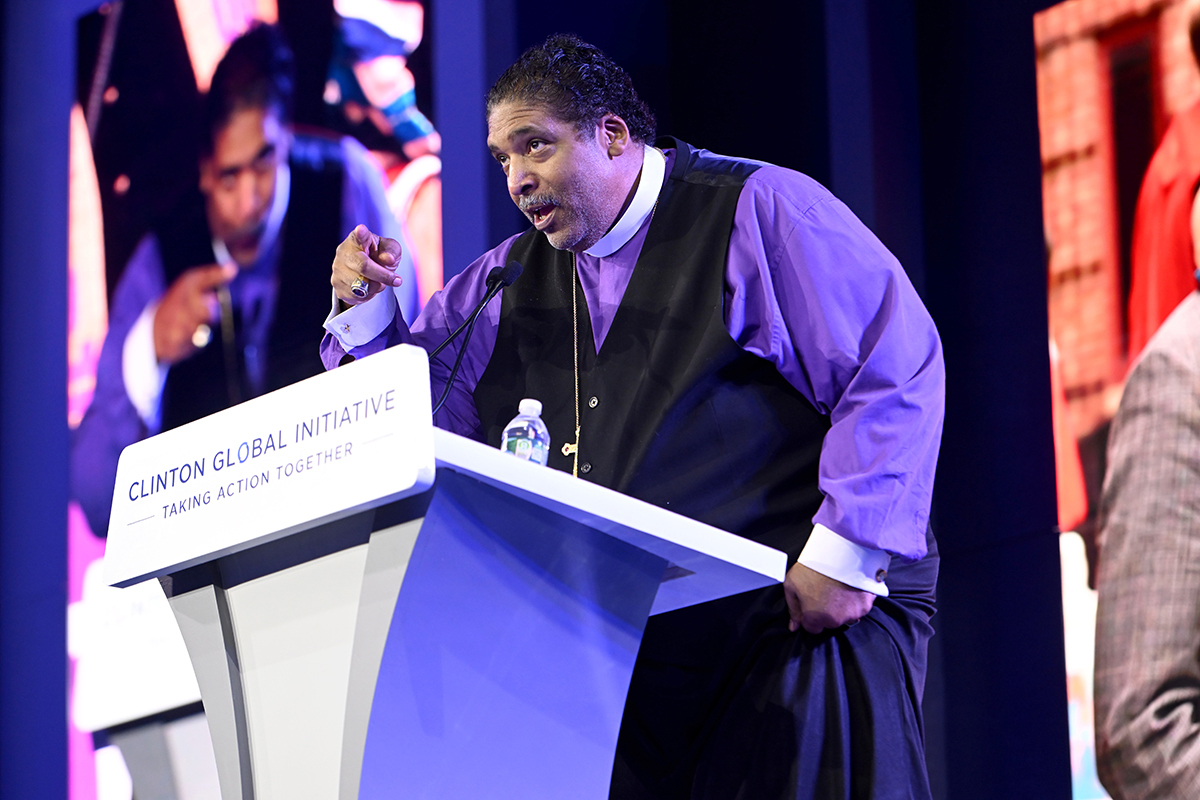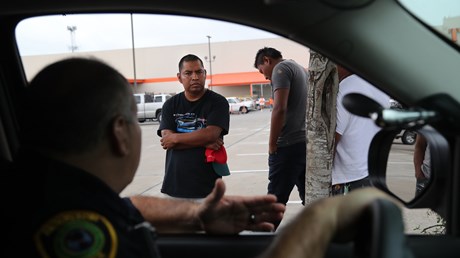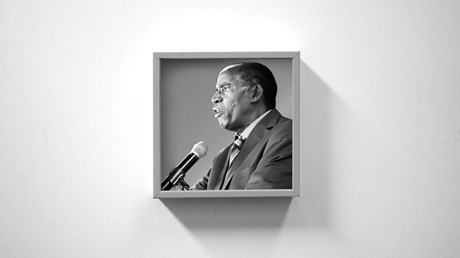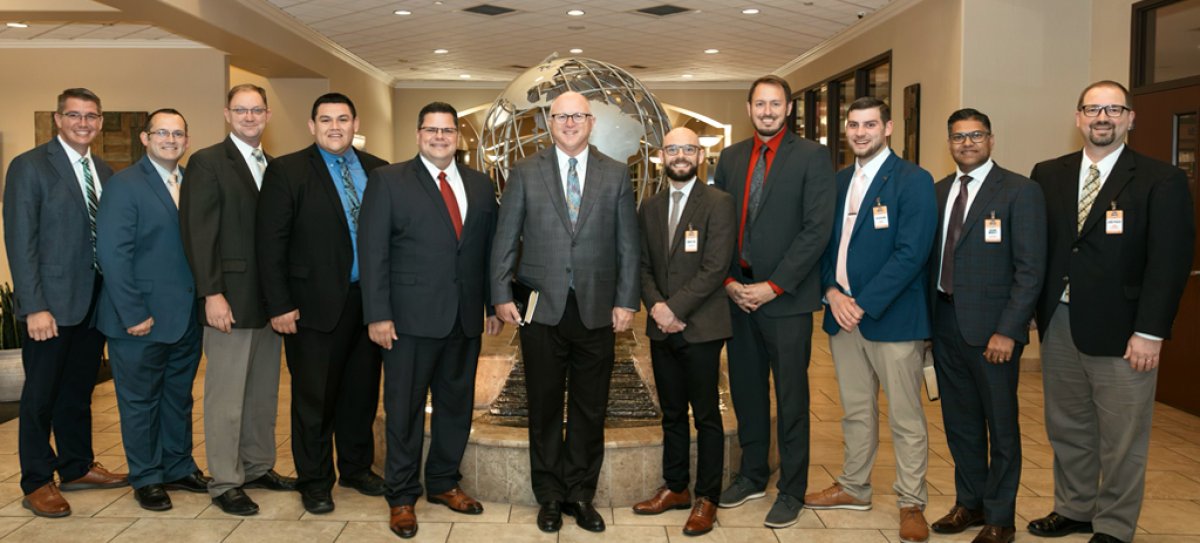Searched: Christian and School
News
Two new memoirs, Troubled and Between Two Trailers, make a powerful—if unintentional—case for the Christian ethos of family and community.
 Growing up, our car radio was always tuned to 90.7, American Family Radio. We lived about 15 minutes from the nearest town, so we spent a lot of time driving. If we were lucky, Mr. Whittaker’s warm, grandfatherly voice invited us to join him for Adventures in Odyssey. But more often, we’d listen to alarmed (and alarming) talks from Tim Wildmon, president of the American Family Association, or Focus on the Family’s James Dobson, each warning my parents of all the ways the world was coming for us.Their message was convincing, and not only for my parents. I’d plug my ears when Ms. Barbie, my warm-hearted school bus driver who wore denim cutoffs and had brightly lacquered nails, sometimes tuned her portable radio to 96.9 KISS FM, “Amarillo’s #1 Hit Music Station,” and started singing along to secular music on the 45-minute ride to school. I felt palpable relief when I instead climbed aboard to the sound of Garth Brooks crooning about his friends in low places. After all, everyone in Texas knows God has a soft spot for country.One of the strangest things about being raised in that embattled mindset was how my side seemed embarrassed of what we had to offer the wider world. We said we knew the truth about God and humanity, but I got the distinct impression that we were far from confident that the truth could hold its own out there.My elders and the voices they heeded on the radio seemed to take a defensive posture, self-conscious about our intractable fuddy-duddy-ness and anxious that these commitments would cost us. It felt like they weren’t sure we could ever compete on a level field. We had God on our side, but they had MTV. Our only option was to circle ...Continue reading... Growing up, our car radio was always tuned to 90.7, American Family Radio. We lived about 15 minutes from the nearest town, so we spent a lot of time driving. If we were lucky, Mr. Whittaker’s warm, grandfatherly voice invited us to join him for Adventures in Odyssey. But more often, we’d listen to alarmed (and alarming) talks from Tim Wildmon, president of the American Family Association, or Focus on the Family’s James Dobson, each warning my parents of all the ways the world was coming for us.Their message was convincing, and not only for my parents. I’d plug my ears when Ms. Barbie, my warm-hearted school bus driver who wore denim cutoffs and had brightly lacquered nails, sometimes tuned her portable radio to 96.9 KISS FM, “Amarillo’s #1 Hit Music Station,” and started singing along to secular music on the 45-minute ride to school. I felt palpable relief when I instead climbed aboard to the sound of Garth Brooks crooning about his friends in low places. After all, everyone in Texas knows God has a soft spot for country.One of the strangest things about being raised in that embattled mindset was how my side seemed embarrassed of what we had to offer the wider world. We said we knew the truth about God and humanity, but I got the distinct impression that we were far from confident that the truth could hold its own out there.My elders and the voices they heeded on the radio seemed to take a defensive posture, self-conscious about our intractable fuddy-duddy-ness and anxious that these commitments would cost us. It felt like they weren’t sure we could ever compete on a level field. We had God on our side, but they had MTV. Our only option was to circle ...Continue reading... |
Answers in Genesis is producing a brand-new Christian school Bible curriculum that is like no other—Twelve Stones Curriculum! Grades K–2 now available for preorder.
|
 A group of Christian clergy, theologians and scholars who took part in the inaugural conference of the Yale Divinity School's Center for Public Theology & Policy this week signed a declaration denouncing so-called "religious nationalism." A group of Christian clergy, theologians and scholars who took part in the inaugural conference of the Yale Divinity School's Center for Public Theology & Policy this week signed a declaration denouncing so-called "religious nationalism." |
An excerpt from The Sacred Chain: How Understanding Evolution Leads to Deeper Faith.
 I sat by myself at one end of the boardroom, fidgeting with a few notes on the table in front of me. At the other end were about ten older men in suits and ties peering over their tables, arms crossed. It wouldn’t have been difficult for someone just walking in to determine which end of the room held the power.After my brief opening statement, the rest of our time was set aside for “discussion.” The two-hour meeting felt more like an inquisition. The first questioner hardly let the silence settle after I spoke: “Jim, I went to school with your father. We even went on a mission trip to Mexico together. I’ve known you since you were a kid. What happened to you?”I’ve replayed this scene in my head a hundred times, varying what I say in an attempt to get my accusers to stand up, shake my hand, and say, “Oh, now we see. That makes sense. Sorry for the trouble.” But every time it ends the same way: I have to give up my position as a tenured professor of philosophy and leave the college I’ve served for 17 years.My crime? Believing what 99 percent of those who have a PhD in biology or medicine believe: that human beings evolved over time and share common ancestors with every other life form on the planet. But this was a small Christian college, one of the places where evolutionary theory is deemed incompatible with Christian beliefs. And not just incompatible—evolution is considered dangerous. These men believed that hearing anything positive about evolution would make students doubt the Bible. If you can’t believe the creation account in the very first chapter of the Bible, their thinking goes, then why believe any of it?I do not believe ...Continue reading... I sat by myself at one end of the boardroom, fidgeting with a few notes on the table in front of me. At the other end were about ten older men in suits and ties peering over their tables, arms crossed. It wouldn’t have been difficult for someone just walking in to determine which end of the room held the power.After my brief opening statement, the rest of our time was set aside for “discussion.” The two-hour meeting felt more like an inquisition. The first questioner hardly let the silence settle after I spoke: “Jim, I went to school with your father. We even went on a mission trip to Mexico together. I’ve known you since you were a kid. What happened to you?”I’ve replayed this scene in my head a hundred times, varying what I say in an attempt to get my accusers to stand up, shake my hand, and say, “Oh, now we see. That makes sense. Sorry for the trouble.” But every time it ends the same way: I have to give up my position as a tenured professor of philosophy and leave the college I’ve served for 17 years.My crime? Believing what 99 percent of those who have a PhD in biology or medicine believe: that human beings evolved over time and share common ancestors with every other life form on the planet. But this was a small Christian college, one of the places where evolutionary theory is deemed incompatible with Christian beliefs. And not just incompatible—evolution is considered dangerous. These men believed that hearing anything positive about evolution would make students doubt the Bible. If you can’t believe the creation account in the very first chapter of the Bible, their thinking goes, then why believe any of it?I do not believe ...Continue reading... |
“We're not being political. We're just trying to get you what you need.”
 Palm Sunday looked different this year for a small majority-immigrant church in Fort Worth. For part of the service, the pastors invited an immigration lawyer to speak about what to expect if Texas enacts a new law that authorizes the state to arrest and deport migrants.“There is a lot of fear in our church in regard to this law and a lot of uncertainty. … What does it mean? How does it affect their cases?” asked Anyra Cano, one of the pastors.The congregation, mostly first-generation immigrants from Latin America, “knows they can come to us when they have those kinds of questions,” she added.Texas’ Senate Bill 4 (SB 4) comes as the latest salvo amid long-standing tensions between Republican Gov. Greg Abbott and the Biden administration over the nation’s immigration enforcement.Last year, over 2.4 million people sought to cross the US-Mexico border. Texas (like other Republican-governed states) has tried to respond by taking matters into its own hands. Abbott signed SB 4 into law in December, making illegal border-crossing not just a federal offense but a state crime.Currently, the bill is tied up in court—a federal appeals court ruled Wednesday that SB 4 will remain on hold.The law would allow Texas police to question and detain anyone they suspect of illegally crossing the US-Mexico border. Though SB 4 doesn’t allow arrests in schools, places of worship, or health care facilities, even the possibility of brushes with police officers with deportation power has raised concerns for immigrant communities in Texas—and for the Christian leaders who serve them.Many of the attendees at Cano’s church do have some kind of status, albeit perhaps not a more permanent ...Continue reading... Palm Sunday looked different this year for a small majority-immigrant church in Fort Worth. For part of the service, the pastors invited an immigration lawyer to speak about what to expect if Texas enacts a new law that authorizes the state to arrest and deport migrants.“There is a lot of fear in our church in regard to this law and a lot of uncertainty. … What does it mean? How does it affect their cases?” asked Anyra Cano, one of the pastors.The congregation, mostly first-generation immigrants from Latin America, “knows they can come to us when they have those kinds of questions,” she added.Texas’ Senate Bill 4 (SB 4) comes as the latest salvo amid long-standing tensions between Republican Gov. Greg Abbott and the Biden administration over the nation’s immigration enforcement.Last year, over 2.4 million people sought to cross the US-Mexico border. Texas (like other Republican-governed states) has tried to respond by taking matters into its own hands. Abbott signed SB 4 into law in December, making illegal border-crossing not just a federal offense but a state crime.Currently, the bill is tied up in court—a federal appeals court ruled Wednesday that SB 4 will remain on hold.The law would allow Texas police to question and detain anyone they suspect of illegally crossing the US-Mexico border. Though SB 4 doesn’t allow arrests in schools, places of worship, or health care facilities, even the possibility of brushes with police officers with deportation power has raised concerns for immigrant communities in Texas—and for the Christian leaders who serve them.Many of the attendees at Cano’s church do have some kind of status, albeit perhaps not a more permanent ...Continue reading... |
His Pentecostalism put him at odds with many but the Deliverance Church founder stood firm in his convictions “to bring back the glory of God back to the Church in these last days.”
 Joe Kayo, known by many as the father of the Pentecostal-Charismatic movement in East Africa, died on November 2, 2023. He was 86.Kayo founded churches in four countries: Deliverance Church Kenya, Deliverance Church Uganda, Juba Pentecostal Church in South Sudan, and Family of God Churches of Zimbabwe. At the time of his death, he was leading the Christian Family Church in Nairobi.Kayo described his ministry as a place “where the power of God is seen working with tangible manifestations, to bring back the glory of God back to the Church in these last days.”Kayo embraced his spiritual calling as African nations were gaining independence from their European colonizers. His vision of creating churches, led and financed by Africans, that contextualized the Christian faith within African culture caught fire throughout East Africa. It also was at odds with many of the churches that traced their roots back to Western missions and with which he tangled frequently over worship styles and the presence of the Holy Spirit.“This is the man God used to break barriers and rocks that stood in front of the charismatic movement and Pentecostalism in East Africa,” said J. B. Masinde, a bishop at a Nairobi congregation Kayo had founded, in 2019. “He paid a price … this man carries scars that some of you will never understand in your life.”The eldest of six children, Joseph Kayo Nyakango was born in Nyamira County, western Kenya on May 5, 1937. When he was 12, his mother died, and he dropped out of school prematurely due to lack of school fees. In despair, Kayo sank into drug abuse and petty crime. Later in life, he would narrate how he attempted to take his own life three times without success.More ...Continue reading... Joe Kayo, known by many as the father of the Pentecostal-Charismatic movement in East Africa, died on November 2, 2023. He was 86.Kayo founded churches in four countries: Deliverance Church Kenya, Deliverance Church Uganda, Juba Pentecostal Church in South Sudan, and Family of God Churches of Zimbabwe. At the time of his death, he was leading the Christian Family Church in Nairobi.Kayo described his ministry as a place “where the power of God is seen working with tangible manifestations, to bring back the glory of God back to the Church in these last days.”Kayo embraced his spiritual calling as African nations were gaining independence from their European colonizers. His vision of creating churches, led and financed by Africans, that contextualized the Christian faith within African culture caught fire throughout East Africa. It also was at odds with many of the churches that traced their roots back to Western missions and with which he tangled frequently over worship styles and the presence of the Holy Spirit.“This is the man God used to break barriers and rocks that stood in front of the charismatic movement and Pentecostalism in East Africa,” said J. B. Masinde, a bishop at a Nairobi congregation Kayo had founded, in 2019. “He paid a price … this man carries scars that some of you will never understand in your life.”The eldest of six children, Joseph Kayo Nyakango was born in Nyamira County, western Kenya on May 5, 1937. When he was 12, his mother died, and he dropped out of school prematurely due to lack of school fees. In despair, Kayo sank into drug abuse and petty crime. Later in life, he would narrate how he attempted to take his own life three times without success.More ...Continue reading... |
CT's outgoing Asia editor recalls how God led him to America, toward the Christian faith, onto the internet, and outward to serve the global Chinese church.
 I was born in southwest China, in the Ganzi (Garzê) Tibetan Autonomous Prefecture of Sichuan Province. Only a few days after birth, I was sent to Chengdu, the province’s capital city. My sister and I were raised by our grandmother while my parents, both medical doctors, were sent by the Communist Party to the rural Tibetan area many high mountains away from the city, where children could not get a decent education.I knew at a very young age that I had to get outstanding grades to enter college and avoid living in the cold and poor mountainous area. I studied hard and excelled in school.At age 16, I went to Shanghai to study chemistry at Fudan University, one of China’s top schools. This was in the 1980s, after China had opened its door to the world. At this time, Chinese universities were quite liberal and tolerant of free thinking, and Fudan was known as one of the most “Westernized” universities.In college, I began to rebel against indoctrination into official Communist ideology, and I wanted to learn more about Western thought and culture. But my worldview had been influenced by years of atheist education. I thought I did not believe in anything and had no interest in any religion.After graduation, I went back to Chengdu and started to work in a research institute as a polymer scientist. After work, I played a lot of mahjong with gambling late at night, but I was unhappy in my heart. After the crackdown on the student movement in Tiananmen Square in 1989, I was heartbroken and lost. (I witnessed similar forms of violent suppression on the streets of Chengdu.) I sank into deep darkness and hopelessness. I could not find an answer to my heart’s questions, and life became meaningless and ...Continue reading... I was born in southwest China, in the Ganzi (Garzê) Tibetan Autonomous Prefecture of Sichuan Province. Only a few days after birth, I was sent to Chengdu, the province’s capital city. My sister and I were raised by our grandmother while my parents, both medical doctors, were sent by the Communist Party to the rural Tibetan area many high mountains away from the city, where children could not get a decent education.I knew at a very young age that I had to get outstanding grades to enter college and avoid living in the cold and poor mountainous area. I studied hard and excelled in school.At age 16, I went to Shanghai to study chemistry at Fudan University, one of China’s top schools. This was in the 1980s, after China had opened its door to the world. At this time, Chinese universities were quite liberal and tolerant of free thinking, and Fudan was known as one of the most “Westernized” universities.In college, I began to rebel against indoctrination into official Communist ideology, and I wanted to learn more about Western thought and culture. But my worldview had been influenced by years of atheist education. I thought I did not believe in anything and had no interest in any religion.After graduation, I went back to Chengdu and started to work in a research institute as a polymer scientist. After work, I played a lot of mahjong with gambling late at night, but I was unhappy in my heart. After the crackdown on the student movement in Tiananmen Square in 1989, I was heartbroken and lost. (I witnessed similar forms of violent suppression on the streets of Chengdu.) I sank into deep darkness and hopelessness. I could not find an answer to my heart’s questions, and life became meaningless and ...Continue reading... |
I served on the RZIM board. Christians in many leadership roles can learn from my failures.
 The room was hot, and I stared at the pristine white table in front of me, being careful not to lift my eyes, my muscles tense. To my left were members of the International Board of Directors of Ravi Zacharias International Ministries (RZIM), seated at the table and joining on video. To my right were lawyers. One of them was preparing to read to us the 12-page report of a months-long investigation into sexual assault allegations regarding the ministry’s founder, Ravi Zacharias.The tension was palpable. The boardroom seemed too dim, although that suited the mood; some of us weren’t ready for bright lights.My experience as an RZIM board member would completely change the way I view ministry today. I believe many ministry boards are broken—or at least deeply unprepared for the challenges they may face—and my aim is to start a conversation on how that can be remedied.When I speak of “boards,” I’m using the term broadly. You and people you know may not serve on the board of an internationally known nonprofit, like RZIM at its peak. But you may serve on your congregation’s elder board, as a deacon, or as a member of the vestry or the pastoral search committee. You may advise your children’s Christian school or informally help steer a local food bank or the Sunday School planning committee at church.The hard lessons I learned will be applicable to almost any kind of group leadership arrangement, especially in ministry contexts but also more broadly. That said, specific needs and circumstances will vary, so I’m sharing my lessons as questions that Christians in board leadership should seriously ask themselves and their colleagues.Continue reading... The room was hot, and I stared at the pristine white table in front of me, being careful not to lift my eyes, my muscles tense. To my left were members of the International Board of Directors of Ravi Zacharias International Ministries (RZIM), seated at the table and joining on video. To my right were lawyers. One of them was preparing to read to us the 12-page report of a months-long investigation into sexual assault allegations regarding the ministry’s founder, Ravi Zacharias.The tension was palpable. The boardroom seemed too dim, although that suited the mood; some of us weren’t ready for bright lights.My experience as an RZIM board member would completely change the way I view ministry today. I believe many ministry boards are broken—or at least deeply unprepared for the challenges they may face—and my aim is to start a conversation on how that can be remedied.When I speak of “boards,” I’m using the term broadly. You and people you know may not serve on the board of an internationally known nonprofit, like RZIM at its peak. But you may serve on your congregation’s elder board, as a deacon, or as a member of the vestry or the pastoral search committee. You may advise your children’s Christian school or informally help steer a local food bank or the Sunday School planning committee at church.The hard lessons I learned will be applicable to almost any kind of group leadership arrangement, especially in ministry contexts but also more broadly. That said, specific needs and circumstances will vary, so I’m sharing my lessons as questions that Christians in board leadership should seriously ask themselves and their colleagues.Continue reading... |
Five Ways to Be Salt and Light in Today's AmericaBrandon CampbellThu, 02/29/2024 - 03:00
 Here in the United States, we are blessed with an incredible level of religious liberty. But if we do not vigilantly guard this liberty, it will erode and eventually be destroyed. We must use the freedom that we have to be the salt of the earth and shine the light of truth.? Below there are five ways Christians can make a difference for Christ and stay engaged in ways that can preserve our religious liberty.1. Pray regularly for your elected officials.? As John Bunyan once said, “You can do more than pray after you have prayed, but you cannot do more than pray until you have prayed.” We should pray for our leaders and let them know we are doing so. “I exhort therefore, that, first of all, supplications, prayers, intercessions, and giving of thanks, be made for all men; For kings, and for all that are in authority; that we may lead a quiet and peaceable life in all godliness and honesty” (1 Timothy 2:1–2).2. Stay informed, and vote with a biblical worldview.? In every election—local, state, and federal—research the candidates and the positions they hold, and vote for candidates with a biblical worldview. We should also pray for more of these candidates to run for office.3. Attend local school board meetings.? Don't be afraid to speak up regarding biblical issues. Additionally, many Christians should consider running for the school board so they can have a direct vote on important issues.? 4. Attend local city council meetings or county supervisor meetings.? Introduce yourself to your mayor, city council members, and county supervisor. Thank them for their service, and let them know you're praying for them. As issues arise, don't be afraid to speak up on concern for religious liberty or public safety.? 5. Know and reach out to your state representative and senator.? Look up the names of those who represent your district in your state legislature. Make an appointment to meet them in their local district office.? Let them know you are praying for them. And call their offices to voice your approval or disapproval of significant legislation.? ? Category Christian Living Tags Patriotic America Here in the United States, we are blessed with an incredible level of religious liberty. But if we do not vigilantly guard this liberty, it will erode and eventually be destroyed. We must use the freedom that we have to be the salt of the earth and shine the light of truth.? Below there are five ways Christians can make a difference for Christ and stay engaged in ways that can preserve our religious liberty.1. Pray regularly for your elected officials.? As John Bunyan once said, “You can do more than pray after you have prayed, but you cannot do more than pray until you have prayed.” We should pray for our leaders and let them know we are doing so. “I exhort therefore, that, first of all, supplications, prayers, intercessions, and giving of thanks, be made for all men; For kings, and for all that are in authority; that we may lead a quiet and peaceable life in all godliness and honesty” (1 Timothy 2:1–2).2. Stay informed, and vote with a biblical worldview.? In every election—local, state, and federal—research the candidates and the positions they hold, and vote for candidates with a biblical worldview. We should also pray for more of these candidates to run for office.3. Attend local school board meetings.? Don't be afraid to speak up regarding biblical issues. Additionally, many Christians should consider running for the school board so they can have a direct vote on important issues.? 4. Attend local city council meetings or county supervisor meetings.? Introduce yourself to your mayor, city council members, and county supervisor. Thank them for their service, and let them know you're praying for them. As issues arise, don't be afraid to speak up on concern for religious liberty or public safety.? 5. Know and reach out to your state representative and senator.? Look up the names of those who represent your district in your state legislature. Make an appointment to meet them in their local district office.? Let them know you are praying for them. And call their offices to voice your approval or disapproval of significant legislation.? ? Category Christian Living Tags Patriotic America |
Four Keys for Raising Up a New Generation of MissionariesDr. Paul ChappellFri, 11/10/2023 - 16:24
 One of the highlights to me of World Impact Missions Conference at Lancaster Baptist Church is seeing missionaries who grew up at Lancaster Baptist and/or graduated from West Coast Baptist College and and are now serving the Lord on mission fields around the world. (The picture above is of WCBC alumni who were here for Missions Conference '23 earlier this week and are now planting churches around the world.)? The Lord has allowed us to see many young people from our own church family—kids who grew up right here in our Sunday school classes and, in many cases, whose parents trusted Christ through the outreach ministry of our church—who are now preaching the gospel in foreign countries. Additionally, there are hundreds of WCBC alumni serving the Lord on over forty foreign fields.? One of the trends that concerns me, however, is a decline of young people across America surrendering their lives to missions. The world population is growing, but fewer American young people seem burdened to reach the world with the gospel.? Certainly God is still calling young people to surrender their lives to preach the gospel. Why then does it seem that fewer are responding?There are certainly many contributing factors we could cite to answer that question. But I believe there are four simple areas of emphasis that could change the trend. And when these four are working together, they can bring a monumental shift.? What is needed to raise up a new generation of missionaries?? 1. Parents who believe it would be a privilege if God calls their childChildren are the gift of God and entrusted by God to parents to raise for God's honor and glory.Lo, children are an heritage of the LORD: and the fruit of the womb is his reward. As arrows are in the hand of a mighty man; so are children of the youth. Happy is the man that hath his quiver full of them: they shall not be ashamed, but they shall speak with the enemies in the gate. (Psalm 127:3–5)Yet, too often Christian parents raise their children with goals of personal satisfaction. These parents are measuring by the world's goals of financial security and career success.? It's good for young people to grow up knowing that their parents' greatest goal for their lives is that they would serve God in whatever way He calls them—including the foreign field.? 2. Churches that emphasize missionsIn Acts 13–14, we read of the first organized program for missions in the New Testament. It began as the church at Antioch sent out Paul and Barnabas on their first missionary journey. After preaching the gospel through many cities and establishing churches, Paul and Barnabas returned to report on all that God had done.? And when they were come, and had gathered the church together, they rehearsed all that God had done with them, and how he had opened the door of faith unto the Gentiles. (Acts 14:27)Can you picture what it was like for the children and young people listening to this first missionary report? They heard about the hardships and the blessings, and I can imagine the sense of wonder and even adventure that Paul's stories stirred in their hearts. No doubt some of them eventually became missionaries themselves.? One of the great strengths of the independent Baptist model of missions, based on Acts 13–14, in which a church sends out missionaries who then come back and report of all God has done on the field, is that young people are exposed to missionaries on a regular basis.? To raise up a new generation of missionaries, churches need to keep the Great Commission of Christ—“Go ye into all the world, and preach the gospel to every creature” (Mark 16:15)—before young people. Encourage children to pray for missionaries. Host regular missions conferences. And highlight the need for laborers in spiritually-dark places around the world.? 3. Christian schools with vibrant chapel services, emphasizing a life of surrender to JesusIn Acts 13, it was the Holy Spirit who called Paul and Barnabas to the work of missions.? As they ministered to the Lord, and fasted, the Holy Ghost said, Separate me Barnabas and Saul for the work whereunto I have called them. (Acts 13:2)But this calling happened in an environment of total dedication to Christ and service for the Lord. These were people who were already ministering to the Lord and fasting.? Effective Christian schools are not just a place to keep your children from the harmful influences of secular education and cultural brainwashing. They are places that proactively encourage a life of surrender to the Lord and are filled with teachers who model the joy of serving Christ.4. Bible colleges led by soulwinning pastors and instructors who teach missions and bring missionaries to campusIt was striking to hear how many of our West Coast Baptist College alumni who came as missionaries to this year's conference mentioned that they had sensed God's call to missions during their time at WCBC. Several even mentioned that it was during one of the Lancaster Baptist Church missions conferences.? Many young people who have surrendered to serve the Lord in full time ministry do not know right after high school in what capacity God would have them serve. Whether or not they ultimately serve as missionaries, being in a Bible college environment where missions is emphasized will strengthen their understanding of and commitment to being part of the Great Commission of Christ to go into all nations with the gospel.? Go ye therefore, and teach all nations, baptizing them in the name of the Father, and of the Son, and of the Holy Ghost: Teaching them to observe all things whatsoever I have commanded you: and, lo, I am with you alway, even unto the end of the world. Amen. (Matthew 28:19–20)About a year and a half ago, while hosting Spiritual Leadership Conference Egypt, I had the opportunity to visit the gravesite of William Borden in Cairo. Borden was a young American missionary living in Egypt to learn Arabic while preparing to preach the gospel to Muslim people in China. While still in Egypt, he contracted meningitis and died at age twenty-five.? As Terrie and I walked through the American cemetery there in Cairo, I was stirred to see the gravesites of other missionaries as well, many who, like Borden, gave their lives for the sake of the gospel on foreign soil. I couldn't help but pray that God will raise up a new generation of men and women who will fully and freely surrender their lives to the spread of the gospel around the world.Whether you are a parent, pastor, Sunday school teacher, Christian educator, or someone with any other influence in young people's lives, I challenge you consider how you can be part of helping young people obey the instruction of Christ to “Lift up your eyes, and look on the fields; for they are white already to harvest” (John 4:35). Category Christian Living One of the highlights to me of World Impact Missions Conference at Lancaster Baptist Church is seeing missionaries who grew up at Lancaster Baptist and/or graduated from West Coast Baptist College and and are now serving the Lord on mission fields around the world. (The picture above is of WCBC alumni who were here for Missions Conference '23 earlier this week and are now planting churches around the world.)? The Lord has allowed us to see many young people from our own church family—kids who grew up right here in our Sunday school classes and, in many cases, whose parents trusted Christ through the outreach ministry of our church—who are now preaching the gospel in foreign countries. Additionally, there are hundreds of WCBC alumni serving the Lord on over forty foreign fields.? One of the trends that concerns me, however, is a decline of young people across America surrendering their lives to missions. The world population is growing, but fewer American young people seem burdened to reach the world with the gospel.? Certainly God is still calling young people to surrender their lives to preach the gospel. Why then does it seem that fewer are responding?There are certainly many contributing factors we could cite to answer that question. But I believe there are four simple areas of emphasis that could change the trend. And when these four are working together, they can bring a monumental shift.? What is needed to raise up a new generation of missionaries?? 1. Parents who believe it would be a privilege if God calls their childChildren are the gift of God and entrusted by God to parents to raise for God's honor and glory.Lo, children are an heritage of the LORD: and the fruit of the womb is his reward. As arrows are in the hand of a mighty man; so are children of the youth. Happy is the man that hath his quiver full of them: they shall not be ashamed, but they shall speak with the enemies in the gate. (Psalm 127:3–5)Yet, too often Christian parents raise their children with goals of personal satisfaction. These parents are measuring by the world's goals of financial security and career success.? It's good for young people to grow up knowing that their parents' greatest goal for their lives is that they would serve God in whatever way He calls them—including the foreign field.? 2. Churches that emphasize missionsIn Acts 13–14, we read of the first organized program for missions in the New Testament. It began as the church at Antioch sent out Paul and Barnabas on their first missionary journey. After preaching the gospel through many cities and establishing churches, Paul and Barnabas returned to report on all that God had done.? And when they were come, and had gathered the church together, they rehearsed all that God had done with them, and how he had opened the door of faith unto the Gentiles. (Acts 14:27)Can you picture what it was like for the children and young people listening to this first missionary report? They heard about the hardships and the blessings, and I can imagine the sense of wonder and even adventure that Paul's stories stirred in their hearts. No doubt some of them eventually became missionaries themselves.? One of the great strengths of the independent Baptist model of missions, based on Acts 13–14, in which a church sends out missionaries who then come back and report of all God has done on the field, is that young people are exposed to missionaries on a regular basis.? To raise up a new generation of missionaries, churches need to keep the Great Commission of Christ—“Go ye into all the world, and preach the gospel to every creature” (Mark 16:15)—before young people. Encourage children to pray for missionaries. Host regular missions conferences. And highlight the need for laborers in spiritually-dark places around the world.? 3. Christian schools with vibrant chapel services, emphasizing a life of surrender to JesusIn Acts 13, it was the Holy Spirit who called Paul and Barnabas to the work of missions.? As they ministered to the Lord, and fasted, the Holy Ghost said, Separate me Barnabas and Saul for the work whereunto I have called them. (Acts 13:2)But this calling happened in an environment of total dedication to Christ and service for the Lord. These were people who were already ministering to the Lord and fasting.? Effective Christian schools are not just a place to keep your children from the harmful influences of secular education and cultural brainwashing. They are places that proactively encourage a life of surrender to the Lord and are filled with teachers who model the joy of serving Christ.4. Bible colleges led by soulwinning pastors and instructors who teach missions and bring missionaries to campusIt was striking to hear how many of our West Coast Baptist College alumni who came as missionaries to this year's conference mentioned that they had sensed God's call to missions during their time at WCBC. Several even mentioned that it was during one of the Lancaster Baptist Church missions conferences.? Many young people who have surrendered to serve the Lord in full time ministry do not know right after high school in what capacity God would have them serve. Whether or not they ultimately serve as missionaries, being in a Bible college environment where missions is emphasized will strengthen their understanding of and commitment to being part of the Great Commission of Christ to go into all nations with the gospel.? Go ye therefore, and teach all nations, baptizing them in the name of the Father, and of the Son, and of the Holy Ghost: Teaching them to observe all things whatsoever I have commanded you: and, lo, I am with you alway, even unto the end of the world. Amen. (Matthew 28:19–20)About a year and a half ago, while hosting Spiritual Leadership Conference Egypt, I had the opportunity to visit the gravesite of William Borden in Cairo. Borden was a young American missionary living in Egypt to learn Arabic while preparing to preach the gospel to Muslim people in China. While still in Egypt, he contracted meningitis and died at age twenty-five.? As Terrie and I walked through the American cemetery there in Cairo, I was stirred to see the gravesites of other missionaries as well, many who, like Borden, gave their lives for the sake of the gospel on foreign soil. I couldn't help but pray that God will raise up a new generation of men and women who will fully and freely surrender their lives to the spread of the gospel around the world.Whether you are a parent, pastor, Sunday school teacher, Christian educator, or someone with any other influence in young people's lives, I challenge you consider how you can be part of helping young people obey the instruction of Christ to “Lift up your eyes, and look on the fields; for they are white already to harvest” (John 4:35). Category Christian Living |
An old adage states there are two things a polite conversation never includes—religion and politics. But in the past forty-five years, religion and politics have meshed to the point of syncretism. Political ideals have replaced many Christians' zeal for the Lord with fervor for a Christian nation via politics. At what point does politics become an idol, and what are the warning signs this is happening?What Event Spurred Christians to Pay More Attention to Politics?The Christian Post reports on the Moral Majority, “Founded by the Rev. Jerry Falwell in 1979, the Moral Majority advocated for conservative positions on issues like abortion, homosexuality, and school vouchers. It also helped millions of Christians register to vote.” The organization gave rise to the impetus that Christians who engage in politics, both as candidates and supporters, are honoring to God because Christians will bring a moral rightness to a largely secular civil realm.Photo credit: ©Getty Images/natasaadzic
|
Five Ways to Be Salt and Light in Today's AmericaBrandon CampbellThu, 02/29/2024 - 03:00
 Here in the United States, we are blessed with an incredible level of religious liberty. But if we do not vigilantly guard this liberty, it will erode and eventually be destroyed. We must use the freedom that we have to be the salt of the earth and shine the light of truth.? Below there are five ways Christians can make a difference for Christ and stay engaged in ways that can preserve our religious liberty.1. Pray regularly for your elected officials.? As John Bunyan once said, “You can do more than pray after you have prayed, but you cannot do more than pray until you have prayed.” We should pray for our leaders and let them know we are doing so. “I exhort therefore, that, first of all, supplications, prayers, intercessions, and giving of thanks, be made for all men; For kings, and for all that are in authority; that we may lead a quiet and peaceable life in all godliness and honesty” (1 Timothy 2:1–2).2. Stay informed, and vote with a biblical worldview.? In every election—local, state, and federal—research the candidates and the positions they hold, and vote for candidates with a biblical worldview. We should also pray for more of these candidates to run for office.3. Attend local school board meetings.? Don't be afraid to speak up regarding biblical issues. Additionally, many Christians should consider running for the school board so they can have a direct vote on important issues.? 4. Attend local city council meetings or county supervisor meetings.? Introduce yourself to your mayor, city council members, and county supervisor. Thank them for their service, and let them know you're praying for them. As issues arise, don't be afraid to speak up on concern for religious liberty or public safety.? 5. Know and reach out to your state representative and senator.? Look up the names of those who represent your district in your state legislature. Make an appointment to meet them in their local district office.? Let them know you are praying for them. And call their offices to voice your approval or disapproval of significant legislation.? ? Category Christian Living Tags Patriotic America Here in the United States, we are blessed with an incredible level of religious liberty. But if we do not vigilantly guard this liberty, it will erode and eventually be destroyed. We must use the freedom that we have to be the salt of the earth and shine the light of truth.? Below there are five ways Christians can make a difference for Christ and stay engaged in ways that can preserve our religious liberty.1. Pray regularly for your elected officials.? As John Bunyan once said, “You can do more than pray after you have prayed, but you cannot do more than pray until you have prayed.” We should pray for our leaders and let them know we are doing so. “I exhort therefore, that, first of all, supplications, prayers, intercessions, and giving of thanks, be made for all men; For kings, and for all that are in authority; that we may lead a quiet and peaceable life in all godliness and honesty” (1 Timothy 2:1–2).2. Stay informed, and vote with a biblical worldview.? In every election—local, state, and federal—research the candidates and the positions they hold, and vote for candidates with a biblical worldview. We should also pray for more of these candidates to run for office.3. Attend local school board meetings.? Don't be afraid to speak up regarding biblical issues. Additionally, many Christians should consider running for the school board so they can have a direct vote on important issues.? 4. Attend local city council meetings or county supervisor meetings.? Introduce yourself to your mayor, city council members, and county supervisor. Thank them for their service, and let them know you're praying for them. As issues arise, don't be afraid to speak up on concern for religious liberty or public safety.? 5. Know and reach out to your state representative and senator.? Look up the names of those who represent your district in your state legislature. Make an appointment to meet them in their local district office.? Let them know you are praying for them. And call their offices to voice your approval or disapproval of significant legislation.? ? Category Christian Living Tags Patriotic America |
 The Satanic Temple agreed to a settlement with Pennsylvania's Saucon Valley School District last week for $200,000 in legal fees and access to their buildings for their After School Satan Club. It's another victory for those who oppose Christian supremacy by appealing...The post If Good News Clubs get access to public schools, so does After School Satan Club appeared first on Baptist News Global. The Satanic Temple agreed to a settlement with Pennsylvania's Saucon Valley School District last week for $200,000 in legal fees and access to their buildings for their After School Satan Club. It's another victory for those who oppose Christian supremacy by appealing...The post If Good News Clubs get access to public schools, so does After School Satan Club appeared first on Baptist News Global. |
Four Ways Christian Education Strengthens FamiliesEric LeeTue, 07/11/2023 - 13:24
 The objective of all true educators is to provide learning to students. But the framework in which that takes place in a Christian school is clearly distinctive from its secular counterparts. Our colleagues in the arena of public education see the state as the party responsible for educating a child. As Christians, we view this responsibility differently because we see it through the lens of Scripture which plainly declares that this weight rests on the shoulders of parents: “And ye shall teach them your children, speaking of them when thou sittest in thine house, and when thou walkest by the way, when thou liest down, and when thou risest up†(Deuteronomy 11:19). “And, ye fathers, provoke not your children to wrath: but bring them up in the nurture and admonition of the Lord†(Ephesians 6:4). A Christian school can assist parents as parents delegate part of this responsibility to trustworthy educators. Christian education, rather than competing with parental responsibility, can greatly aid parents. Here are just a few of the ways that Christian education strengthens families.1. A Biblical Wordlview“Wherefore I beseech you, be ye followers of me. For this cause have I sent unto you Timotheus, who is my beloved son, and faithful in the Lord, who shall bring you into remembrance of my ways which be in Christ, as I teach every where in every church†(1 Corinthians 4:16–17).Godly teachers can reaffirm the biblical worldview already being taught in the home. The student's forming and acceptance of biblical beliefs is aided by the compounding effect of hearing the same truth from multiple angles and perspectives. When the message from Sunday is echoed by the math teacher on Monday, its ability to penetrate the heart is enhanced. When the verse discussed during family devotions Thursday night is the memory verse in Bible class, there is a cumulative effect.Conversely, a number of competing secular influences consistently attempt to chisel away at the biblical foundation laid in a Christian home. Sunday's message and Thursday's family devotions can be drowned out by the varied opposing voices of the secular world. The Bible warns that a young person is not to listen: “Cease, my son, to hear the instruction that causeth to err from the words of knowledge†(Proverbs 19:27). Parents are in a key position to protect their children from those voices.2. Daily Exposure to Godly Mentors and Role Models“He that walketh with wise men shall be wise: but a companion of fools shall be destroyed†(Proverbs 13:20).The mentors and role models a young person is exposed to on a daily basis in a Christian school can be spiritually strengthening. The coach of the sports team, school administrator, cafeteria volunteer, music teacher, classroom instructor, and guest chapel speaker are just some of the individuals God can use in a young person's life. These servants of God can inspire transformation in the lives of students. God certainly worked in my life this way, and I am eternally grateful for the influence of men like my high school coach who God used to call me into that same ministry. 3. Wholistic Development“And Jesus increased in wisdom and stature, and in favour with God and man†(Luke 2:52). Mankind is a multi-faceted creature with physical, emotional, and social needs. Sports, music, and extracurricular opportunities are key components in most schools. A wholistic development, though, must include spiritual development. Christian education not only provides Bible classes, but it also infuses and integrates Scripture and a biblical worldview into every aspect of education. Christian education strengthens families by providing an education of the total student in a wholistic way that education which deemphasizes the spiritual nature of man and often promotes anti-Christian views cannot provide.4. A Nurturing Environment “Be not deceived: evil communications corrupt good manners†(1 Corinthians 15:33).It would be foolish to claim that Christian education is immune from sinful behavior. Unfortunately, the sins of society penetrate the walls of a Christian school too. But Christian education actively seeks to create a habitat that exposes these destructive attitudes and actions for what they truly are. In a biblically-based way Christian education provides a nurturing environment that is the kind of spiritual soil necessary for young people to experience consistent growth. This Christian greenhouse is extremely beneficial for a young person as they establish their foundation for life. While this brief list is far from exhaustive in outlining the benefits of Christian education to the Christian family, it does provide a taste of the type of joy-filled partnership that can result from this biblical model. The fruit of this partnership between parents and Christian educators is well worth the time, money, and energy involved in laboring to train the next generation of Christian leaders. Together the home and Christian school can experience the incredible blessing of seeing God continue to develop laborers for His harvest. Category Family Helps Tags Christian Education Parenting Family Helps Family The objective of all true educators is to provide learning to students. But the framework in which that takes place in a Christian school is clearly distinctive from its secular counterparts. Our colleagues in the arena of public education see the state as the party responsible for educating a child. As Christians, we view this responsibility differently because we see it through the lens of Scripture which plainly declares that this weight rests on the shoulders of parents: “And ye shall teach them your children, speaking of them when thou sittest in thine house, and when thou walkest by the way, when thou liest down, and when thou risest up†(Deuteronomy 11:19). “And, ye fathers, provoke not your children to wrath: but bring them up in the nurture and admonition of the Lord†(Ephesians 6:4). A Christian school can assist parents as parents delegate part of this responsibility to trustworthy educators. Christian education, rather than competing with parental responsibility, can greatly aid parents. Here are just a few of the ways that Christian education strengthens families.1. A Biblical Wordlview“Wherefore I beseech you, be ye followers of me. For this cause have I sent unto you Timotheus, who is my beloved son, and faithful in the Lord, who shall bring you into remembrance of my ways which be in Christ, as I teach every where in every church†(1 Corinthians 4:16–17).Godly teachers can reaffirm the biblical worldview already being taught in the home. The student's forming and acceptance of biblical beliefs is aided by the compounding effect of hearing the same truth from multiple angles and perspectives. When the message from Sunday is echoed by the math teacher on Monday, its ability to penetrate the heart is enhanced. When the verse discussed during family devotions Thursday night is the memory verse in Bible class, there is a cumulative effect.Conversely, a number of competing secular influences consistently attempt to chisel away at the biblical foundation laid in a Christian home. Sunday's message and Thursday's family devotions can be drowned out by the varied opposing voices of the secular world. The Bible warns that a young person is not to listen: “Cease, my son, to hear the instruction that causeth to err from the words of knowledge†(Proverbs 19:27). Parents are in a key position to protect their children from those voices.2. Daily Exposure to Godly Mentors and Role Models“He that walketh with wise men shall be wise: but a companion of fools shall be destroyed†(Proverbs 13:20).The mentors and role models a young person is exposed to on a daily basis in a Christian school can be spiritually strengthening. The coach of the sports team, school administrator, cafeteria volunteer, music teacher, classroom instructor, and guest chapel speaker are just some of the individuals God can use in a young person's life. These servants of God can inspire transformation in the lives of students. God certainly worked in my life this way, and I am eternally grateful for the influence of men like my high school coach who God used to call me into that same ministry. 3. Wholistic Development“And Jesus increased in wisdom and stature, and in favour with God and man†(Luke 2:52). Mankind is a multi-faceted creature with physical, emotional, and social needs. Sports, music, and extracurricular opportunities are key components in most schools. A wholistic development, though, must include spiritual development. Christian education not only provides Bible classes, but it also infuses and integrates Scripture and a biblical worldview into every aspect of education. Christian education strengthens families by providing an education of the total student in a wholistic way that education which deemphasizes the spiritual nature of man and often promotes anti-Christian views cannot provide.4. A Nurturing Environment “Be not deceived: evil communications corrupt good manners†(1 Corinthians 15:33).It would be foolish to claim that Christian education is immune from sinful behavior. Unfortunately, the sins of society penetrate the walls of a Christian school too. But Christian education actively seeks to create a habitat that exposes these destructive attitudes and actions for what they truly are. In a biblically-based way Christian education provides a nurturing environment that is the kind of spiritual soil necessary for young people to experience consistent growth. This Christian greenhouse is extremely beneficial for a young person as they establish their foundation for life. While this brief list is far from exhaustive in outlining the benefits of Christian education to the Christian family, it does provide a taste of the type of joy-filled partnership that can result from this biblical model. The fruit of this partnership between parents and Christian educators is well worth the time, money, and energy involved in laboring to train the next generation of Christian leaders. Together the home and Christian school can experience the incredible blessing of seeing God continue to develop laborers for His harvest. Category Family Helps Tags Christian Education Parenting Family Helps Family |
A Christian substitute teacher who was ousted from her job for opposing a same-sex-themed book has been reinstated and awarded $181,000 in damages and attorneys' fees in a settlement with a Georgia school district on Monday.
|
Unless you are homeschooled or go to a Christian school, you live around and are educated by the world. This is not new – it has been going on for a very long time. State schools began in Boston in 1635 so the devil has had plenty of time to deposit his wickedness in their … Continue reading Living in an Anti-Christian
|
Members of a United Methodist congregation in Russia were without a church Sunday, April 13, after authorities closed it for running a Sunday School without government permission, the latest in a series of police raids targeting Christian education, Christians said.
|
Eritrean authorities confiscated and burned 1,500 Bibles from new high school students who arrived at country's main military training city, and detained eight students who protested the destruction of the books, Christians said Wednesday, October 15.
|
This is a special article by Jim Krohn, Youth Pastor of Southeast Bible Baptist Church and author of the book "Biblical Youth Work", from which this article is an adaptation. Keep an eye on Uthleader.com within the next week and you will be able to order "Biblical Youth Work" at a UthLeader special price. “The Family Cult†Part 1 of 3 Don’t chuck your Youth Ministry        What is the family cult? If you don’t know the answer to that question, consider yourself blessed. The family cult is a name that I have given to a movement that is gaining ground in fundamental churches. It emphasizes the family above all things. While I agree that the family is extremely important, they take things to absurd proportions. For example, according to this movement, Sunday school is bad because it divides the family. Sunday evening services are bad because it takes the family out of the home. Instead, they encourage a Sunday evening family worship time with the father as the patriarch of the home leading the proceeding. Of course, I call that family devotions and I think that is something that should be done during the week. It is not something that you do instead of church. In addition, while public school is obviously bad, this movement paints all Christian schools with the same brush as public schools since they take children away from the family. Youth groups as well as all other age specific activities should be stopped. They also use terms such as “family centered church†instead of “program centered churchâ€Â.     ÂÂ
|



 Links
Links  Articles
Articles  Blogs
Blogs  Videos
Videos  News
News  Colors
Colors 

 New links
New links

